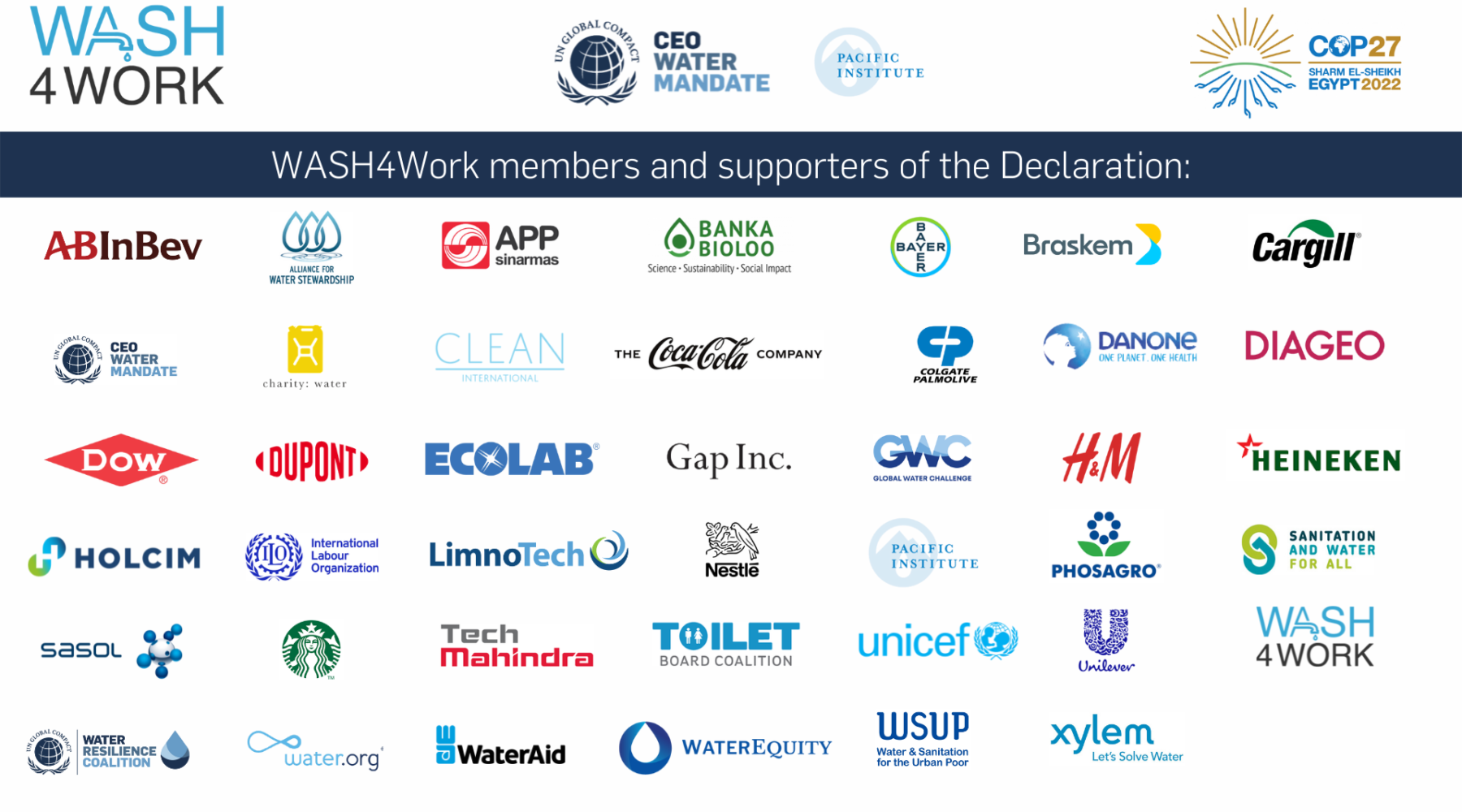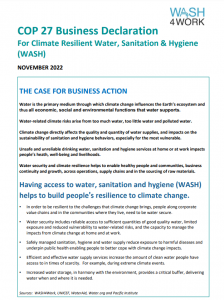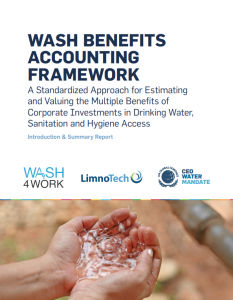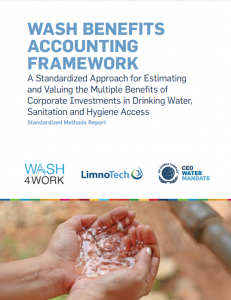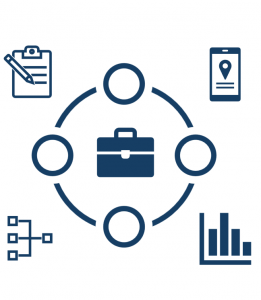
Climate Resilient WASH
In our 2021 Insights Report, Raising our Ambition to WASH Resilience, WASH4Work set out to convene global WASH stakeholders and corporate members to develop consensus and alignment on the new expectations to integrate climate resilience considerations into WASH programs and investments—and what this means in the context of corporate water stewardship commitments. On the occasion of the COP27 United Nations Climate Change Conference, global businesses and WASH expert organizations came together via the WASH4Work initiative to launch a joint statement of aligned commitments to taking action towards the advancement of SDGs 6 and 13 by 2030, with the goal of enabling millions of people to become more water secure and climate-resilient.
The declaration outlines the case for business action; considerations for further developing and applying a climate resilience framework to WASH programs and investments; and invites more businesses to join us in this COP27 declaration, to mobilize the leadership and partnerships needed to shape a more climate-resilient WASH-secure world.
The business case for investing in WASH access is getting stronger. While the past few years have demonstrated a need for safely managed sanitation, hygiene, and water supply to reduce exposure to harmful diseases such as COVID-19, a remaining risk to WASH access is climate change. Climate change directly affects the quality and quantity of water supplies and impacts the sustainability of WASH behaviors, especially for the most vulnerable.
To ensure the continued success of our communities, businesses, and supply chains – the impact of climate change on access to WASH must be fully understood. Going forward we join global and local stakeholders in developing and applying a climate-resilient WASH framework to our water, sanitation, and hygiene access programs and investments.
- WASH4Work 2022 Insights Report: https://wash4work.org/wp-content/uploads/sites/20/2023/03/WASH4Work_Insights-Report-2022.pdf
- UNICEF and Global Water Partnership (GWP). (2017). WASH Climate Resilient Development. Strategic Framework.
https://www.gwp.org/globalassets/global/about-gwp/publications/unicef-gwp/gwp_unicef_strategic_
framework_web_artwork.pdf - UNICEF. (2020). UNICEF Guidance note. How UNICEF regional and country offices can shift to climate resilient
WASH programming. https://www.unicef.org/media/109006/file/UNICEF- guidance-note-climate-shift.pdf
Water.org. (2020). Increasing resiliency in the face of climate change. How WSS systems and financing can adapt
to meet the challenge. https://water.org/documents/248/Increasing_Resiliency_in_the_face_of_climate_
change.pdf - WaterAid. (2021). Programme guidance for climate resilient WASH. https://washmatters.wateraid.org/sites/g/
files/jkxoof256/files/programme-guidance-for-climate-resilient-water-sanitation-and-hygiene.pdf
Standardized Accounting Method for the Co-Benefits of WASH
Ensuring safely managed and climate-resilient drinking water, sanitation and hygiene access (WASH) for employees and workers—at work and home—can yield multiple benefits across communities, businesses and their supply chains.
As corporate water goals and targets expand in response to growing water-related risks, stakeholders have expressed the need for standardized methods for implementing and accounting for the multiple benefits of WASH activities.
The WASH Benefits Accounting Framework is the outcome of a WASH4Work initiative. It has been developed through extensive stakeholder engagement, a multi-stakeholder process of discussions and inputs between June 2022 and April 2024, and informed by five corporate pilots conducted between July 2023 and February 2024. This Framework has been designed for consistency with other corporate water stewardship benefit accounting approaches such as Volumetric Water Benefit Accounting, Nature-Based Solutions Benefit Accounting, and the upcoming Water Quality Benefit Accounting. In addition, this Framework draws upon existing leading practice tools for corporate action on WASH.
A framework to support companies in calculating the value of investments mitigating the increasing business risks of unsafe WASH. This tool can be used to assess the effectiveness of WASH interventions and to drive continuous improvements. This standardized accounting framework for corporate WASH outputs, outcomes and impacts advances leading practice for alignment with corporate water stewardship goals, and accounts for the multiple benefits of water stewardship activities.
Accounting for the Multiple Benefits of Corporate WASH Investments
WASH benefits include the multiple positive outcomes and impacts of ensuring safely managed and climate-resilient WASH services for employees and workers—at work and at home, across corporate operations, supply chains and in the communities where the company operates.
The WASH Benefits Accounting Framework aims to standardize the most commonly accepted indicators of WASH benefits (core indicators). In addition, the Framework embeds new indicators of leading practice which reflect the forward looking goals for WASH access such as climate resilient WASH, gender equality and financial return on investment (advanced indicators).
WASH benefit accounting provides corporate water stewardship practitioners with a standardized approach of recommended core and advanced benefit indicators, with calculation methods to quantify and communicate the socio-economic, environmental and institutional benefits of corporate investments in safely managed and climate-resilient WASH services.
Prior to using the methods proposed, companies will need to assess the status of WASH services for employees and workers—at work and home—and exposure to risks due to local and community WASH challenges, as well as clear and well-defined corporate WASH goals and targets.
A four-step process is suggested, and elaborated in the Introduction & Summary Report:
- Understanding WASH risks and identifying gaps in WASH access;
- Defining WASH stewardship project goals, activities and partners;
- Selecting WASH benefits indicators & methods; and recording baseline data;
- Gathering project data and calculating WASH benefits from each WASH project.
The WASH Benefits Accounting Framework: Introduction & Summary Report
A summary of the approach and proposed steps to apply WASH benefits accounting in the broader context of corporate water stewardship goals and activities related to drinking water, sanitation and hygiene access. It is a companion document to Standardized Methods for Estimating and Valuing the Multiple Benefits of Investments in Drinking Water, Sanitation, and Hygiene Access. This document is intended for corporate water stewardship leaders to inform broader corporate impact measurement and reporting, and for WASH stakeholders to inform leading practice on corporate WASH stewardship.
Standardized Methods Report
This report provides detailed guidance for corporate WASH practitioners and implementing partners on how to apply the indicators and calculation methods of the WASH Benefits Accounting Framework.
Authors
Cheryl Hicks, WASH4Work
Nate Jacobson, LimnoTech
Wendy Larson, LimnoTech
Gregg Brill, CEO Water Mandate
Giuliana Moreira, WASH4Work
Contributors
This project was supported by The Coca-Cola Company, Diageo, Microsoft, Orbia, Reckitt, and Water.org.
The WASH Benefits Accounting Framework was reviewed and piloted by The Coca-Cola Company, Diageo, Microsoft, Orbia and Reckitt companies and implementing partners: Agua Segura, Global Water Challenge, The Coca-Cola Foundation, UNICEF Colombia, WaterAid and Water.org.
For more information contact WASH4Work I https://wash4work.org/ I secretariat@wash4work.org
For more information contact WASH4Work I https://wash4work.org/ I secretariat@wash4work.org
Introduction & Summary Report
Standardized Methods Report
WASH Stewardship Toolbox
Access to clean water, sanitation, and hygiene (WASH) is a fundamental human right and a cornerstone of sustainable development. Businesses play a crucial role in advancing WASH access—not only within their direct operations but also throughout their supply chains and the communities they influence. However, corporate engagement in WASH has often been fragmented, characterized by isolated interventions rather than integrated, strategic approaches.
To address this gap, WaterAid and WASH4Work (W4W) have partnered to develop the WASH Stewardship Roadmap—a structured framework designed to guide companies in embedding WASH best practices into their sustainability strategies. This initiative supports businesses in adopting a systematic approach to WASH stewardship, emphasizing climate resilience, gender equity, and human rights considerations.
The WASH Stewardship Roadmap will provide a structured framework for integrating WASH into corporate water stewardship and human rights strategies. Designed to support companies at all stages of their WASH journey, the Roadmap will help businesses—from those just beginning to explore their role in WASH to those aiming to lead in global best practices—adopt a systematic and impactful approach. It will offer practical tools, frameworks, and guidance to drive meaningful progress.
The Roadmap will guide companies through the following key stages:
- Understand & Prepare – Recognize the significance of WASH within corporate operations and supply chains, laying the groundwork for action by aligning with global best practices and industry standards.
- Assess – Evaluate current WASH performance, risks, and opportunities using diagnostic tools and frameworks to establish a clear baseline.
- Commit – Define measurable goals and targets that align with broader corporate sustainability and water stewardship commitments.
- Act – Implement targeted interventions to enhance WASH access, embed WASH principles into business operations, and engage employees and communities in meaningful initiatives.
- Disclose – Transparently report on WASH progress, challenges, and impact, ensuring alignment with corporate responsibility frameworks and regulatory requirements.
By following this structured approach, companies can transition from isolated interventions to sustained, impactful WASH leadership.
The success of the WASH Stewardship Toolbox depends on collaboration and shared learning. Businesses, NGOs, investors, and other key stakeholders are encouraged to engage in the following ways:
- Advisory Group Participation – Companies can join the Advisory Group to provide insights and feedback on the development of the Roadmap and Toolbox, ensuring these resources align with industry needs and priorities.
- Pilot Implementation – Organizations are invited to pilot elements of the Toolbox and Roadmap, sharing case studies and lessons learned to refine and enhance these resources.
- Knowledge Sharing & Events – WASH4Work and WaterAid will host interactive workshops, webinars, and global forum events to gather input, showcase success stories, and drive the adoption of WASH best practices.
- Toolbox Contributions – Companies and partners with existing WASH-related tools, frameworks, or case studies can contribute to the growing repository of resources, strengthening the Toolbox’s relevance and practical application.
By engaging with the WASH Stewardship Roadmap, companies can take meaningful steps toward sustainable and equitable WASH access—enhancing their environmental and social responsibility commitments while contributing to global water security and resilience.
For more information or to get involved, please contact WASH4Work at secretariat@wash4work.org


